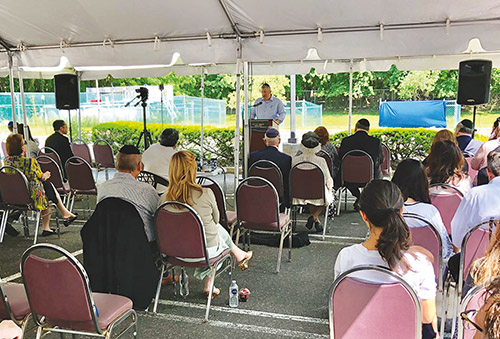




For most shuls climbing out of the COVID-19 era, simply returning to normal operations is enough. Dayenu. Some shuls, though, have drawn vital lessons from the past 15 months and been prompted to think bigger. One strong example of such an approach is the Young Israel of East Brunswick (YIEB).
On Sunday, May 23, YIEB formally launched a Torah-writing fundraising campaign. The campaign, slated to conclude in October, will fund the writing and dedication of a new, smaller sefer Torah for the shul that can be comfortably carried and used in life-cycle events, such as at shiva houses and smachot.
Dr. Seth Cohen, the campaign co-chair, explained that this initiative is intended to bring the YIEB community together in the first major shul activity since March 2020, to celebrate the revitalization of the shul. It will also enable members to recognize those families that lost loved ones in the pandemic and/or suffered economic distress, through dedications of the new Torah. Cohen added that the funds raised in this initiative will, in addition to supporting the acquisition of a new Torah, allow YIEB to secure funds to maintain the shul’s other Torahs and to help support an annual scholar-in-residence program.
The formal launch event featured two well-regarded speakers—the shul’s newly appointed rav, Rabbi Joshua Hess, who officially starts in August, and the internationally renowned storyteller and Torah educator, Rabbi Pesach Krohn. Rabbi Hess remarked that we read in this week’s parsha, Behaalotcha (10:35): “When the Ark departed, Moshe would say, ‘Rise Hashem and may your enemies disperse and those who hate you flee before you.’” At that time in Jewish history, the ark led the way in the desert and the Jewish people followed it. Now, most commonly, Jews go to the Torah, which resides in shuls.
Rabbi Hess said there is a discussion in halachic sources as to whether or not a Torah can be taken out of a shul for functions outside. While removing a Torah from a shul is not generally condoned, the halacha allows it when it is done to aid the tzibur in serving a communal need or to bring honor to Torah. Both objectives will be served by YIEB’s new Torah, and Rabbi Hess urged everyone to support the campaign to write the new Torah.
Rabbi Krohn started his talk by stating that a Torah is “a bond with the past, and a link with the future. It is a guidepost for our lives and the thread that runs through all of Jewish history.” He shared the story of the rosh yeshiva of the Gateshead Yeshiva in London, who took a walk with a student of the yeshiva in a local park a few decades ago and pointed out a falling leaf. The rosh yeshiva said to the student that the leaf may believe it is now free and can travel unrestrained but it will soon wither, because it is disconnected from its source of sustenance. He continued that we must learn from the leaf and strive to stay connected to our source of sustenance, the Torah, which is described in the pasuk in Mishlei (Proverbs 3:18) as “Etz Chaim he, l’machazikim bah” (“It is a Tree of Life to those who grasp her.”).
Rabbi Krohn cited a Midrash Tanhuma that asks why the Torah starts with the Hebrew letter bais and answers that it symbolizes that Hashem created things in pairs, to tell us that we all need each other and no-one can exist alone. The letter bais reminds us of those pairs. He pointed out that each Torah scroll contains 600,000 letters, to recall the 600,000 Jews who left Egypt. Just as a Torah is not kosher if one letter is missing, so too is the Jewish people not complete if a Jew is disconnected from Jewish life. Just as a Torah is not valid if two letters are touching, so too every Jew stands on his or her own and has a unique contribution to make to the Jewish people. And just as there are no one letter words in the Torah, so too must we recognize that each Jew needs others to succeed.
“This was an inspiring morning, with words of Torah and inspiration from our incoming rabbi, Rabbi Hess, and from Rabbi Krohn,” said YIEB member Dr. Ethan Wasserman. “It’s a wonderful way to start getting back to normal after a challenging year, with the writing of a new sefer Torah and an informal introduction of Rabbi Hess to our community.”
“This campaign to dedicate a new sefer Torah is our opening start to returning to a sense of normalcy after this horrific pandemic,” said David Rabinowitz, the incoming president of the shul. “Our goal is to expand on our successes as a shul dedicated to shalom, to peace, to Torah learning, to kindness and honorable behavior. Everyone who wants to move to central New Jersey can be sure that they are coming to a truly caring community dedicated to all its members and to its youth. This campaign reflects those goals.”
The Torah dedication opportunities are priced to encourage broad participation at all levels. Dedicating the Sefer or Mantel costs $5000 each, special sections of note such as Az Yashir, Birchat Kohanim, Hamalach HaGoel, Shema and others (15 total) cost $720 each, A Perek costs $500, an Aliyah costs $360, a Pasuk costs $180, a word costs $72 and a children’s letter costs $36. YIEB looks forward to holding the hachnasat sefer Torah event in early October, after the chagim.
For more information on this campaign, please visit yieb.org/form/sefertorah.html or scan the QR code accompanying this news story.










